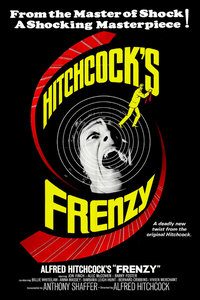Frenzy (1972)

By 1972, Hollywood legend Alfred Hitchcock had somewhat gone off the boil with only Torn Curtain and Topaz to show for the 8 years since Marnie. But, when Hollywood stops calling, there’s always TV or British films. So, he returned to Britain to film Frenzy, which would turn out to be his second-last film. (Anyone who has seen Family Plot may wish to reflect that it would have been better for all concerned if Frenzy had remained his last.)
The 1970s in Britain—certainly in British film and TV—were a vehemently politically incorrect time. Racial and sexual equality were, it’s fair to say, some way off. I tell you all this because Frenzy begins with what is, to modern audiences, a most astonishing exchange.
Two senior advocates, straight from the High Court, are discussing London’s Necktie Murderer with a barmaid. Both agree that they wouldn’t like to have a serial killer as a client as there’s no suitable defence. The barmaid interjects that the killer doesn’t just strangle the women with his necktie, but rapes them first. And (I am not making this up, it really happens) second law guy says, “Well, every cloud has a silver lining, eh?” It’s just a throwaway line, but it actually is more unsettling than any of the gruesome murders that follow. And the murders are nothing if not lurid.
But, back to the film... Richard Blaney (Finch) is down on his luck. He’s just lost the latest of a succession of dead-end jobs, meaning he’s penniless and homeless. As a last resort, he drops by to see his ex-wife (Barbara Leigh-Hunt), who now runs a successful dating agency. She’s still got a soft spot for Richard, so she slips some cash into his pocket while he’s not looking. But life is about to get worse for Richard as his friend Bob Rusk (Foster, best known as TV’s Van Der Valk) is, in fact, none other than the Necktie Murderer. And Bob intends to kill Richard’s ex-wife and his current girlfriend (Massey), too. But the police are after Richard, believing that he is the killer.
There’s two schools of thought for this film. One is that the film itself is viewed more harshly because of its director. The other view is that the film benefits from being elevated out of the ordinary simply because it is directed by the great man. The truth, as with so many things in life, lies somewhere in the middle.
Compared to the great Hitchcock work—the golden years between 1950 and 1961 when he could seemingly do no wrong—Frenzy is not that great. Yes, it’s dated by its clothes, its attitudes and some of the crap that passes for 1972 psychological evaluation of deviant behaviour. But, compared to other films of its era and to other serial killer films since, it’s a welcome entry to the genre.
On the plus side, Finch is perfect for the central role, all impotent fury at his plight, and there’s a well-rounded set of supporting characters, too. Particular mention has to go to Alec McCowen and Vivian Merchant as Chief Inspector and Mrs Oxford who play out a dinner scene which is the absolute highlight of the entire movie. You will never hear the word “tequila” again without thinking of the delightful Mrs Oxford, I can promise you that.
British comedy legend Bernard Cribbens gets a rare straight role as the bar manager with an eye for Richard’s girlfriend, at whose expense Shaffer has some pointed things to say about the glamorisation of murder and the public’s interest in the gruesome details. Billie Whitelaw and Clive Swift as the couple who can but won’t provide Richard with an alibi are also all too believable.
Not vintage Hitchcock, but by far the best film of his later career.
FYI, Hitchcock’s cameo comes 3 minutes into the film. He can been seen in the centre of a crowd wearing a bowler hat and is the only one not applauding the speaker.